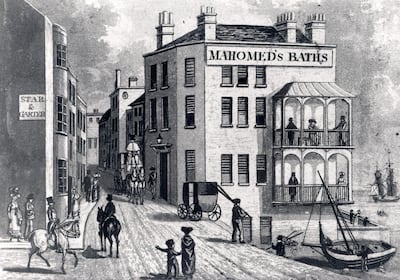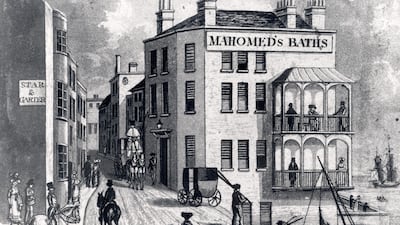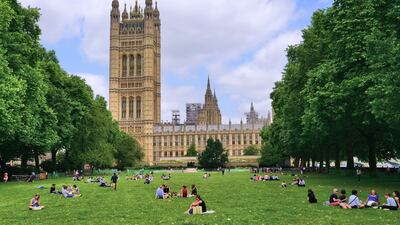After high tea, the cuisine most embedded in London’s identity may well be Indian food.
Not only is it enormously popular, with more than 100 Indian restaurants across the English capital, but this Asian cuisine represents the wide spectrum of influences in one of the world’s most ethnically diverse cities.
Indian food is so intrinsically linked to London that, each October, the city celebrates Curry Week.
Which is why I was not impressed by the small plaque I found in central London in September. It seemed like such an insignificant tribute for the man who pioneered Indian cuisine in the capital.
That description, in itself, is an inadequate one for Sake Dean Mahomed, a Muslim who left a sizeable imprint on Europe in the late 1700s to mid-1800s.

Mahomed not only opened London's first Indian restaurant, he did business with royalty, was the first Indian author published in English, and popularised the practice of shampooing across the continent.
After reading about his remarkable life this year, I decided to follow Mahomed’s trail. From the ancient markets of Ireland to the high streets and leafy parks of London, I traced the journey of this fascinating character who departed India in 1784 to become a celebrity in Europe.
I started in a city close to my heart: Cork. This Irish metropolis, where my father was born and raised, was Mahomed’s landing point when he arrived in Europe at the age of 25.
Set on the banks of the River Lee, which flows into the nearby Atlantic Ocean, Cork is an attractive city with a population of about 200,000.
Cork would have been an exotic environment for a young Indian man in the 18th century, a time when Ireland was almost entirely Caucasian.
At the heart of this city is the English Market. Housed within a stately old building, it hosts more than 50 businesses, from butchers to fishmongers, jewellers, fresh produce vendors, and shops selling clothing, instruments, handicrafts and Irish art.
This market would have been one of the few places in Cork where Mahomed felt somewhat at home. That’s because it was the city’s chief trading place and sold spices and ingredients from over the world, including India. It had only recently been built when Mahomed arrived in Cork from his home town of Patna in north-east India.

This stage of his life is explained in The Travels of Dean Mahomed, a book that combines Mahomed’s writings with a vivid description of his time in Ireland and England by historian Michael H Fisher.
Mahomed travelled to Ireland under the patronage of Godfrey Evan Baker, Fisher writes. He had met this wealthy Irishman in India, where Baker worked for the British East India Company.
Baker’s social standing opened doors for Mahomed, who married into an upper-class Irish Protestant family.
At a time when it was illegal for Irish Catholics and Irish Protestants to marry, a relationship between a white Irish woman and an Indian man was so scandalous that they had to elope in 1876.
Soon, however, this couple found a place in Cork high society, partly due to Mahomed’s burgeoning reputation as a writer.
Back in India, Mahomed had been a trainee surgeon. But it was writing that stoked his passions. In 1794, he earned acclaim across Europe and back home for his debut book, The Travels of Dean Mahomed, which highlighted his adventures across India.
After more than 20 years in Cork, where he had become wealthy and well known, Mahomed moved his family to London in search of fresh opportunities.
They took up residence in upmarket Portman Square. Many visitors to London now wander through this area, which is bordered by tourist magnets such as Hyde Park, Oxford Street and Madame Tussauds.
It was there, on George Street, that I found the plaque bearing Mahomed’s name. That marks the former location of the Hindoonstane Coffee House, London’s first Indian restaurant, opened by Mahomed in 1810. Decorated by Indian artworks and bamboo furniture, the Hindoostane aimed to recreate not only the food but also the atmosphere of restaurants in northern India.
It earned generous reviews, particularly for its robust curries. Yet merely four years later Mahomed closed its doors and declared bankruptcy. London was not quite ready to adopt Indian food – it would take until the mid-1900s before this cuisine went mainstream.

Mahomed wasn’t defeated, though. In 1814 he moved to Brighton, in England’s deep south, and charted a course back to success. Not by writing or restaurants, but instead through a new scene that was gaining popularity among wealthy Brits – indoor bathing.
Ocean swimming was not popular with Britain’s upper classes due to the bracing water temperatures. So Mahomed opened a facility that funnelled seawater into an indoor pool, where it was heated to create a luxurious bathing environment. These days, Brighton is a very popular seaside resort and tourists constantly pass the site of Mahomed’s bath house, 100 metres from Brighton Palace Pier, famed for its theme rides and entertainment arcades.
Back when Mahomed arrived in Brighton it was just becoming a tourism destination. Many wealthy visitors were interested in new age health and beauty treatments. Mahomed cashed in. At his bath house he offered treatments never before seen in Britain. Most of them originated from India, including what became his signature service – shampooing with Indian oils.
So popular was this form of aromatherapy massage that Mahomed soon earned the curious title of “shampooing surgeon” to British kings William IV and George IV.
Tourists to this pretty resort can learn more about Mahomed at Brighton Museum.
It was in this city, at the age of 91, that an end came to the phenomenal life of Mahomed. He left behind a trail from Northern India through Cork, London and England’s southern seaside that tourists can still follow.
A young Muslim man who headed for the horizon and, through his vibrant writing and entrepreneurial nous, blazed a path for others to follow.







